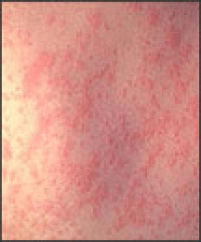Measels

According to the Centers for Disease Control (CDC), there have been 704 reported individual cases of Measles in the United States since January 1, 2019. Last week 78 new cases were reported, which is the most amount of cases reported since 1994. Although many people have received the Measles vaccine, pockets of people in the US have not. If you are not sure if you, or the person you are supporting, have received the vaccine, contact your doctor. They will be able to check a vaccine record if one is available or discuss tests that will show if you or the person you support are protected.
The following facts and information from the CDC can assist you in keeping you and loved ones safe.
Measles can be serious.
Some people think of measles as just a little rash and fever that clears up in a few days, but measles can cause serious health complications, especially in children younger than 5 years of age. There is no way to tell in advance the severity of the symptoms the child will experience.

Measles is very contagious.
Measles spreads through the air when an infected person coughs or sneezes. It is so contagious that if one person has it, 9 out of 10 people around him or her will also become infected if they are not protected. People can get measles just by being in a room where a person with measles has been, even up to two hours after that person has left. An infected person can spread measles to others even before knowing he/she has the disease—from four days before developing the measles rash through four days afterward.
Measles symptoms include:

- Runny nose
- Red eyes
- Two or three days after symptoms begin, tiny white spots (Koplik spots) may appear inside the mouth.
- Three to five days after symptoms begin, a rash breaks out. It usually begins as flat red spots that appear on the face at the hairline and spread downward to the neck, trunk, arms, legs, and feet. Small raised bumps may also appear on top of the flat red spots. The spots may become joined together as they spread from the head to the rest of the body. When the rash appears, a person’s fever may spike to more than 104° Fahrenheit.
Common complications:
Common measles complications include ear infections and diarrhea.
- Ear infections occur in about 1 out of every 10 children with measles and can result in permanent hearing loss.
- Diarrhea is reported in less than 1 out of 10 people with measles.
Severe complications:
- Some people may suffer from severe complications, such as pneumonia (infection of the lungs) and encephalitis (swelling of the brain). They may need to be hospitalized and could die.
- As many as 1 out of every 20 children with measles gets pneumonia, the most common cause of death from measles in young children.
- About 1 child out of every 1,000 who get measles will develop encephalitis (swelling of the brain) that can lead to convulsions and can leave the child deaf or with intellectual disability.
- For every 1,000 children who get measles, 1 or 2 will die from it.
- Measles may cause pregnant woman to give birth prematurely, or have a low-birth-weight baby.
Long-term complications:
- Subacute sclerosing panencephalitis (SSPE) is a very rare, but fatal disease of the central nervous system that results from a measles virus infection acquired earlier in life. SSPE generally develops 7 to 10 years after a person has measles, even though the person seems to have fully recovered from the illness. Since measles was eliminated in 2000, SSPE is rarely reported in the United States.
- Among people who contracted measles during the resurgence in the United States in 1989 to 1991, 4 to 11 out of every 100,000 were estimated to be at risk for developing SSPE. The risk of developing SSPE may be higher for a person who gets measles before they are two years of age.
If you have been exposed to the measles:
- Immediately call your doctor and let them know that you have been exposed to someone who has measles.
- Stay away from settings where there are susceptible people (such as schools, hospitals, or childcare facilities) until your doctor says it’s okay to return.
Your doctor will:
- Make special arrangements to evaluate you, if needed, without putting other patients and medical office staff at risk, and determine if you are immune to measles based on your vaccination record, age, or laboratory evidence.
- If you are not immune to measles, MMR vaccine or a medicine called immune globulin may help reduce your risk developing measles. Your doctor can advise and monitor you for signs and symptoms of measles.
For additional information about the measles: https://www.cdc.gov/measles/index.html orhttps://www.health.pa.gov/topics/Documents/Diseases%20and%20Conditions/Measles%20.pdf







